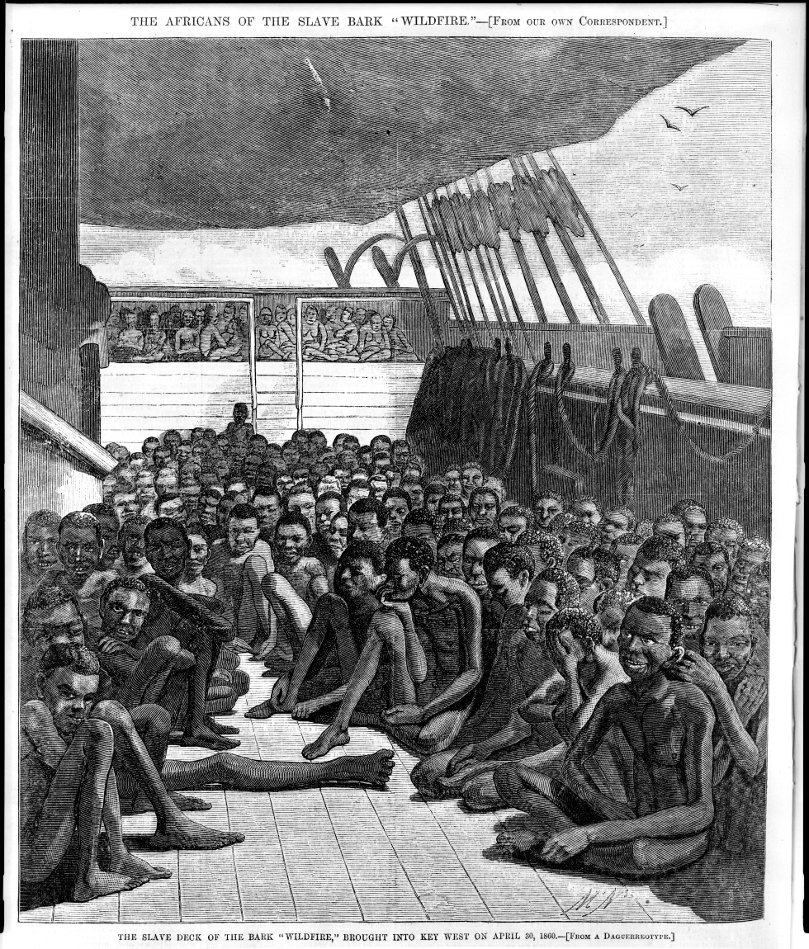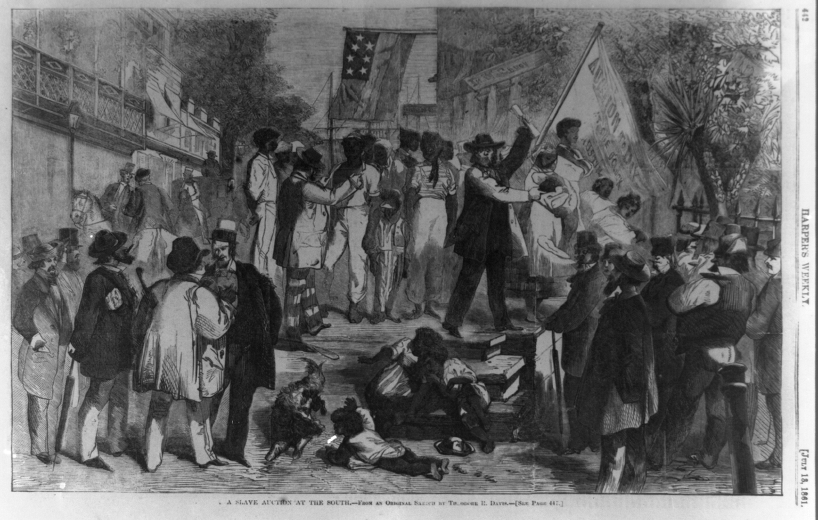
Passionate Abolitionist and
Witness to the American Civil War


Passionate Abolitionist and
Witness to the American Civil War

This letter includes both family content as well as an introduction to the growing conflicts between the states Starts with much unattractive complaining about folk not replying to his letters and his seeming alienation even from his own brother, John.
He sounds miserable yet nostalgic for “Old England”
Gives an account of the mechanization of his rope making business with spinning jennies.
Then he starts talking about the “very lively” politics that he is witnessing. “The battle is between freedom and bondage, liberty and slavery.”
Provides a summary of which of the then 32 states are free and which are slave and for the first time talks with passion about his opposition to slavery and “the demagogues” who support it.
This was written only a few months before the first shots of the war were fired on April 1861.

1860 – The slave deck of the ship bringing slaves to Florida.
African men crowded into the lower deck; African women crowded in an upper deck

1861 A slave auction in the south
African people of all ages being auctioned off in front of a crowd of men
ENVELOPE ADDRESSED TO:
Mr. Caleb Slater
Rope maker
Langley Mill
near Eastwood
Nottinghamshire
England
Europe
Postmark shows that it arrived on Nottingham, England on Nov 6, 1860. Postage stamp has been removed
Reading October 21, 1860
Dear Cousin,
It is now some time since I received a letter from you, or any of your family. I have wundered somewhat at your silence & really do not know of any reason for it. I have given no cause for it, and have no accusations to make against any of your family except this causeless silence & coldness. However, I have a rule of my own in all family matters, and that is, not to show coldness or neglect towards the innocent and unoffending of any of my distant relatives let the behaviour of the rest of them be whatsoever it may. So I am anxious to know how my poor Aunt Riley is getting along. I have been waiting for a letter from some of you untill I am out of patience, & the winter is drawing near, and poor Aunt Riley may perhaps need the assistence her American Nephews are anxious to give her. So I inclose you a draft for £4 sterling for her. And request you to provide her, with it, any little comforts she may need for the coming winter. It is a contribution of one pound each from John. William & Amos Watson & myself. And I request you, as a personal favor, to write to me and acknowledge the receipt of it, and say how she is. I think it very unlikely that I shall ever see her again in this world. I have always had a great desire to see “my own dear native land” once again, “& have intended to see it too, if I was spared to this life, untill I could spare time and money to make the voyage. But, somehow or other, that desire to see “Old England” again is getting less now. The reason is, because I begin to see that I should be ‘a stranger in the land of my birth’ and unknown in the home of my childhood.
page 2
None of my wife’s relatives have written to me for years & do not answer my letters. Why I do not know. And latterly my brother John has taken upon himself to be offended at me too, & got his head full of all manner of ridiculous notions, how and for what cause I know not. But at all events, he has not written to me these two years, and I suppose would hardly be civil to me if I were to call on him at his own house. So if I have no friends or relatives in England who would welcome me there, what is the use of going. Still I know my poor Old Aunt would be glad to see me and I would go a good way to see her. And if she lives many years longer I may come all the way to England to see her any how. I often go 125 miles to see my Aunt Watson & mean to see her as often as I can. She is the only one of my Father’s sisters here. & her and Aunt Riley are the only Aunts I have on earth. The Uncles are all gone long ago. Well, all are “passing away”. My brother Edward lost his wife a few weeks ago and now he is a widower too. So it goes & so we are all going. Still my own health is better now than it has been any time in the last fifteen years. I have got much better of the asthma that troubled me so badly & so long.
Trade here is still very dull and every thing drags slowly along except time and politics. Time flies fast and politics are very lively. Quite as exciting as I have ever seen them.
The battle is between freedom and bondage, liberty and slavery. We have fifteen slave states in the thirty two that make up this great liberty loving nation. And in them are 4 millions of slaves and six millions of free people. The free states have about sixteen or eighteen millions of people in them & no
page 3
slaves. The number of actual slave owners in the slave states is only about three hundred and fifty thousand, and yet, strange to say, these few slave owners have hitherto always had the control of the national government & might have had it yet, but they got too arogant and insolent and overbearing, & wanted to spread slavery all over the new territories & claimed the right to take their slaves over & through all the free states. And strange to say, the party that sides with them and wants to give them all they ask, and let them rule is the Democratic party. The party to which most of the poor labouring men belong that have nothing to live on but their labour, and would never be rich enough to buy a slave if they lived and worked 100 years. (a good slave is worth from two to five hundred pounds English in the slave states]. But these poor fools are misled by rascally political demagogues, who excite the ignorant prejudices of the poor whites against the blacks, and all who have any african blood in them, although they may be so near white that you would not know the difference between them and pure whites. In fact some the dark complexion white men here, are not as white as some of the whitest of the slaves are.
But the Anglo-Saxon love of liberty will prevail in all the free states & the slavery party will be beaten. We have just beaten them here in Pennsylvania, & elected a Antislavery governer by over thirty two thousand majority of votes. The free states of Ohio and Indiana have also gone for the Antislavery party & so has the free state of Maine. These are the only five of the free states that have voted. The remaining twelve free states will also vote against the slavery party and slavery in the American nation will not be extended any-
page 4
more than its present limits, which God knows, are far too large already. We elect a president of the United States, that is the chief magistrate of the whole American nation, slave states & free states on the 6th November & shall be sure to Elect a Antislavery president, and he will be the first antislavery president that this nation ever had since the days of General Washington who died over 60 years ago. Such has been, hitherto the controlling power of the slave owners in this boasted nation of freemen. I have not room to say much more.
We have spinning jinnies in our walk now and only employ six men and four boys. Nearly all the rope made in the United States is made by machinery & steam power now. Small work, bed cords, wash lines and twine too. A boy of 14 or 15 years old can tend two double jinnies and they will spin 6 or 700 lb tub(?) of yarn in a day, as fine as 25 to 28 threads a hook to a 3 inch rope.
We have hackling machinery too, that enables one man to do 5 or 6 men’s work. And as to forming and laying, 3 men and 2 boys lay and wind up the heaviest rope we make & that is 8 & 9 inches round & 220 yards long. Ropemaking here is very different from what it was at Ilkestone & Handsworth when I was a boy. I must now close. Please give my best love to Aunt Riley accept the same for yourself and all your family from
Yours affectionately
Thomas Jackson

(We have a clear understanding of the relationships of all the people who are mentioned and anyone interested may view them in our contributions to ancestry.com)
Clearly Thomas Jackson has been having a very sad time of late and is now being spurned by his family in all directions. We know by now that he is a widower and that he does not have home but lives as a boarder and that his business is doing badly. His health, and therefor presumably his energy has taken a turn for the better and this is reflected in the letters that follow.
On re-reading this particular letter, it is tempting to be an armchair psychologist and wonder if the idea of writing about the war as it developed may have given TJ a purpose for living when so much else in his life appears to be in shambles.)
We also learn that TJ worked at rope walks both at Ilkeston / Langley Mill in Nottingham (where Caleb still lives) but also at Handsworth (near Birmingham, a different county) during his time in UK before he left for America.
We still need info about what prompted his departure for America.
Unfamiliar names
Spinning jinnies
The spinning jenny is a multi-spool spinning wheel. It was invented c. 1764 by James Hargreaves in Stanhill, near Blackburn, Lancashire in the northwest of England. The device dramatically reduced the amount of work needed to produce yarn, with a single worker able to work eight or more spools at once.
Rope versus cord
Custom among sailors has decreed that the term “rope” indicates that the diameter is one inch or more. Other authorities agree that the diameter may be one-half inch or more.

1860 – The slave deck of the ship bringing slaves to Florida.
African men crowded into the lower deck; African women crowded in an upper deck

1861 A slave auction in the south
African people of all ages being auctioned off in front of a crowd of men